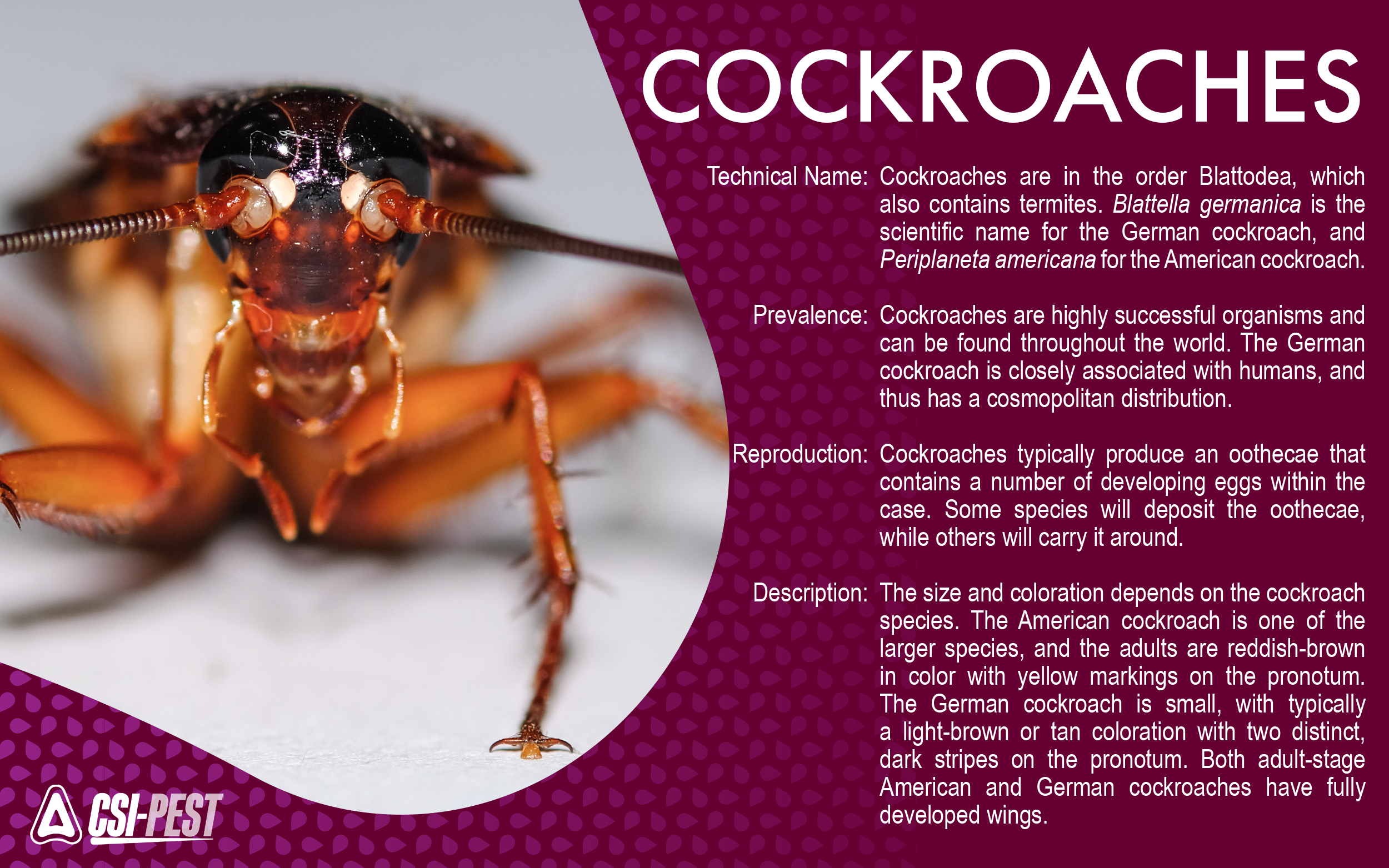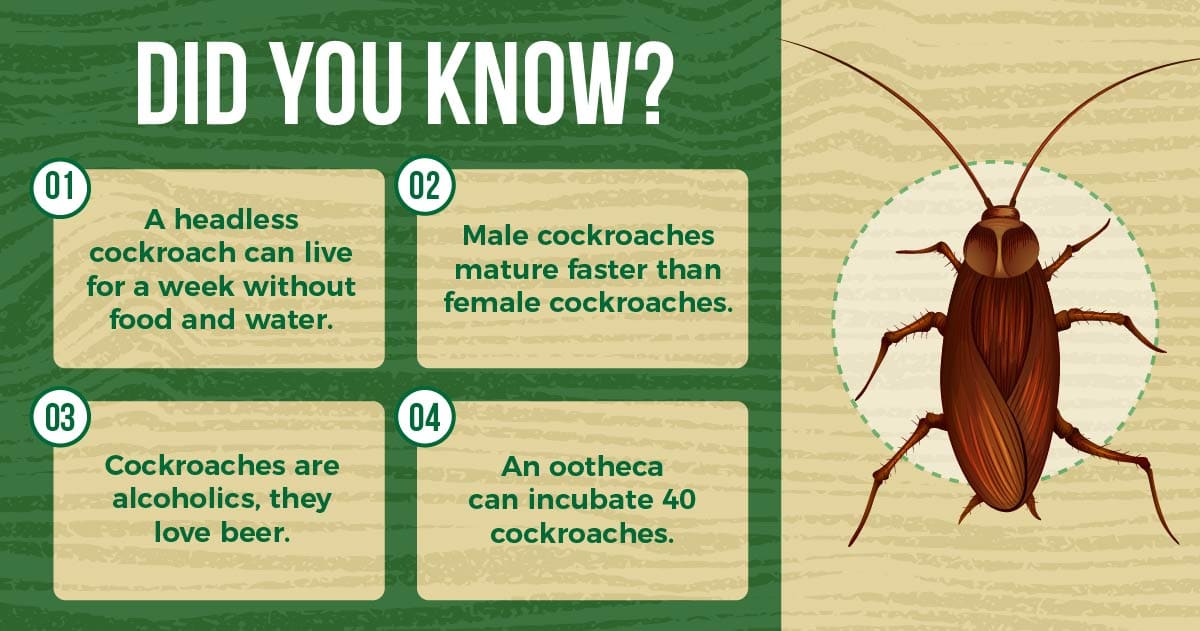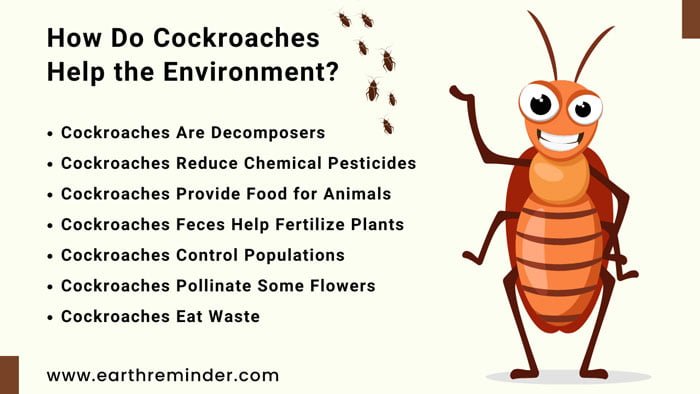Cockroaches are important because they serve as a food source for other animals and play a crucial role in the release of nitrogen, which is essential for plant growth. Without cockroaches, plants would suffer, and without plants, humans would not have oxygen to breathe.

Credit: www.controlsolutionsinc.com
Ecological Importance Of Cockroaches
Cockroaches As Decomposers
Cockroaches play a crucial role as decomposers in ecosystems. They are like little sanitation workers, breaking down leaf litter and animal waste, and returning nutrients to the soil. Their scavenging behavior helps in the decomposition process, contributing to the recycling of organic matter.
Cockroaches As Food For Other Animals
Cockroaches are incredibly important as food for other animals. They may even be the single most important prey for small vertebrates like lizards and birds in tropical rainforests. Their presence in the food chain supports the survival and balance of various animal species.
Cockroaches’ Role In Nutrient Cycling
Furthermore, cockroaches play a significant role in nutrient cycling. Their presence aids in the release of nitrogen, which is essential for plant growth. Without cockroaches, the nutrient cycling process would be disrupted, impacting the overall health and sustainability of ecosystems.

Credit: killem.com.sg
Cockroaches And Plant Life
While cockroaches may not be the most beloved creatures, they play a crucial role in maintaining the delicate balance of our ecosystem. Cockroaches contribute to the well-being of plant life in various ways, from aiding in nitrogen release to impacting plant growth and reproduction.
Cockroaches’ Role In Nitrogen Release
Cockroaches are known for their ability to break down organic matter, including dead plants and animals. As they scavenge for food, they consume decaying material and excrete waste. This waste contains nitrogen-rich compounds, such as uric acid.
When cockroach waste is deposited in the soil, it acts as a natural fertilizer. Nitrogen, an essential nutrient for plant growth, is released into the soil, making it more fertile. Plants then absorb this nitrogen through their roots, promoting their development and overall health.
Impact Of Cockroach Extinction On Plants
If cockroaches were to go extinct, it would have a detrimental impact on plant life. The absence of cockroaches would disrupt the natural cycle of nutrient recycling. Dead plants and animals would decompose at a slower rate, leading to a decrease in the availability of essential nutrients in the soil.
Without the constant breakdown of organic matter by cockroaches, the soil would become less fertile over time. This would result in stunted plant growth, reduced crop yields, and a decline in overall biodiversity. The loss of cockroaches could have far-reaching consequences for ecosystems and the planet as a whole.
Therefore, it is crucial to recognize the importance of cockroaches in maintaining the health and vitality of plant life. While they may be seen as pests by some, their role in nutrient release and ecosystem balance cannot be overlooked.
Cockroaches In Medicine And Science
Cockroaches, often regarded as pests, have surprisingly become an important asset in the fields of medicine and science. Their unique characteristics and biochemical properties have led to various applications that benefit human health. Let’s explore how cockroaches are utilized in these domains.
Cockroaches As A Food Source
One intriguing aspect of cockroaches is their potential as a sustainable food source. In certain cultures, cockroaches are consumed as part of traditional cuisine. They are rich in protein, essential amino acids, and vitamins, making them a nutritious option. Moreover, cockroach farming has gained attention as a way to address food security and reduce environmental impact. These resilient creatures can be efficiently bred, requiring minimal resources and space.
Cockroaches In The Pharmaceutical Industry
The pharmaceutical industry has also recognized the value of cockroaches. These insects possess bioactive compounds with medicinal properties. Researchers have discovered antimicrobial peptides in cockroach hemolymph, which can combat bacteria and fungi. These peptides show potential in developing new antibiotics to combat drug-resistant pathogens. Additionally, cockroach extracts have been investigated for their anti-inflammatory and anticancer properties, opening doors for future drug development.
Cockroaches In Medical Research
Cockroaches serve as valuable subjects for medical research, offering insights into various aspects of human health. Scientists study their ability to withstand extreme conditions, such as radiation exposure and pathogens, which may help unravel mechanisms of human resilience. Cockroaches are also used as models for studying wound healing, as they possess regenerative properties that can guide the development of novel therapies.
In conclusion, cockroaches, often seen as pests, play a crucial role in medicine and science. Whether as a potential food source, a source of bioactive compounds, or subjects for medical research, these resilient insects have proven to be valuable assets in advancing human health and scientific knowledge.
Credit: www.abc.net.au
Sanitation Concerns And Control
Cockroaches And Food Poisoning
Cockroaches are known carriers of various pathogens and bacteria, including Salmonella and E. coli. They can contaminate food and surfaces with these harmful microorganisms, leading to the risk of food poisoning when ingested by humans.
Importance Of Controlling Cockroaches
Controlling cockroach infestations is crucial to prevent the spread of diseases and ensure the safety of food and living environments. It is essential to understand the significance of taking proactive measures to eliminate these pests.
Methods Of Controlling Cockroaches
- Sealing cracks and crevices to prevent entry
- Regular cleaning and removal of food sources
- Application of insecticides and baits
- Professional pest control services
Cockroaches In Human Habitats
Cockroaches are important because they play a vital role in the release of nitrogen which is used by plants. Without them, plants would suffer and produce less oxygen, which is essential for human survival. Additionally, they serve as a food source for other animals, making them an integral part of the ecosystem.
Cockroaches in Human HabitatsCockroaches, one of the most common household pests, are found in almost every part of the world. They are a common sight in homes, restaurants, and hotels, and can be found in almost every nook and corner. While most people consider them a nuisance, cockroaches play a vital role in the ecosystem. In this section, we will discuss the reasons for their presence in homes, their benefits, and drawbacks, and preventive measures to control infestations.Reasons for Cockroach Presence in HomesCockroaches are attracted to human habitats because of the abundance of food, water, and shelter. They thrive in warm and humid environments, making kitchens, bathrooms, and basements their favorite hiding spots. Cockroaches can enter homes through cracks and crevices in the walls, floors, and ceilings. They can also be brought in with infested items such as grocery bags, cardboard boxes, and second-hand furniture.Cockroaches’ Benefits and Drawbacks in HomesCockroaches are scavengers, and they feed on organic matter, including food scraps, dead insects, and animal waste. In this way, they play a vital role in breaking down and recycling nutrients in the environment. However, they can also be carriers of disease-causing pathogens such as Salmonella, E.coli, and Staphylococcus. They can contaminate food, utensils, and surfaces, leading to food poisoning and other illnesses.Preventive Measures for Cockroach InfestationsTo prevent cockroach infestations, it is essential to maintain a clean and hygienic environment. This includes regular cleaning of kitchen counters, sinks, and appliances, storing food in airtight containers, and disposing of garbage properly. Cockroaches can also be deterred by sealing cracks and crevices in walls and floors, fixing leaky pipes and faucets, and reducing clutter in basements and attics.In conclusion, cockroaches play an important role in the ecosystem, but their presence in human habitats can pose health risks. By following proper hygiene practices and taking preventive measures, we can control cockroach infestations and create a safe and healthy living environment.Frequently Asked Questions
Why Are Cockroaches Important To Humans?
Cockroaches are important to humans because they play an integral role in the release of nitrogen, which is used by plants. They also serve as a food source for other animals in the ecosystem. Without cockroaches, plants would suffer, and plants produce oxygen that humans need to breathe.
What Would Happen If Cockroaches Went Extinct?
If cockroaches went extinct, it could disrupt food chains and nutrient cycling in ecosystems. However, it might also alleviate some sanitation concerns.
Are Cockroaches Used For Anything?
Cockroaches are used as a food source for humans and animals, and in the pharmaceutical industry for medicine. They play a role in the release of nitrogen, essential for plant growth. Without cockroaches, plants would suffer, affecting oxygen production. Cockroaches have a purpose in ecosystems.
Conclusion
In the intricate web of nature, even cockroaches have a vital role to play. As scavengers, they contribute to the ecosystem by aiding in the decomposition of organic matter and serving as a food source for other creatures. Understanding their importance helps us appreciate the balance and interconnectedness of the natural world.
Related posts:

I’m MD Tanvir, and I bring years of expertise gained from working closely with pest control companies to the forefront. My journey in the industry has inspired me to launch Bug Battler, a platform aimed at equipping people with the know-how to combat pests autonomously. Through Bug Battler, I aim to empower individuals with practical insights to tackle pest infestations effectively.

